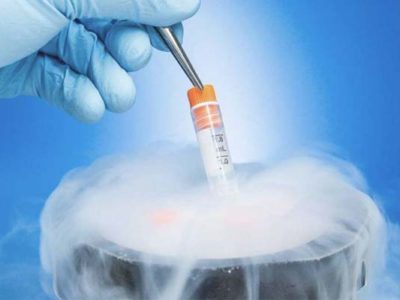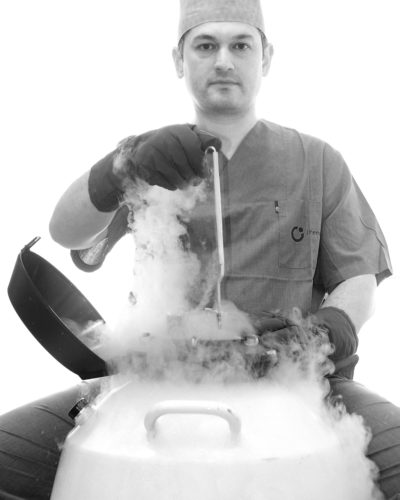Embryo Freezing Process
Embryo freezing, or cryopreservation, is a vital component of assisted reproductive technology, particularly in the context of in vitro fertilization (IVF). The process begins with the stimulation of a woman’s ovaries to produce multiple eggs, which are then retrieved and fertilized with sperm in a laboratory setting. Following a period of culture and assessment, the best-quality embryos are selected for fresh transfer, while surplus embryos of suitable quality undergo cryopreservation. The embryos are meticulously prepared, dehydrated, and treated with a cryoprotectant before undergoing rapid freezing through vitrification. These frozen embryos are then stored in liquid nitrogen at ultra-low temperatures until they are ready for future use. The advantage of embryo freezing lies in its ability to preserve viable embryos, allowing individuals or couples to pursue pregnancy in subsequent IVF cycles without the need for repeated ovarian stimulation. When the time is right, the frozen embryos are thawed and transferred into the woman’s uterus, offering flexibility and enhancing the overall success rates of fertility treatments.


The reasons of Embryo Freezing
Embryo freezing, or cryopreservation, is a common practice in assisted reproductive technology, and several reasons contribute to its importance in fertility treatments:
- Optimizing Treatment Cycles: In a typical IVF cycle, multiple embryos may be created, but it is not always advisable to transfer all of them during the same cycle. Embryo freezing allows for the preservation of surplus embryos of high quality, optimizing the chances of a successful pregnancy without the need for repeated ovarian stimulation and egg retrieval.
- Synchronization of Treatment: Sometimes, medical conditions or personal circumstances may not align with the optimal timing for embryo transfer. Freezing embryos enables the synchronization of the transfer with the woman’s menstrual cycle or other life factors, providing flexibility in planning.
- Medical Reasons: Certain medical conditions or complications may arise during an IVF cycle that makes embryo transfer unsafe or undesirable at that particular time. Embryo freezing allows for the delay of the transfer until the woman’s health is optimal.
- Genetic Testing: In cases where preimplantation genetic testing (PGT) is performed on embryos to screen for genetic abnormalities, freezing allows time for the testing results to be obtained before making decisions about embryo transfer.
- Fertility Preservation: Embryo freezing is often used in fertility preservation scenarios, such as for individuals undergoing cancer treatments that may affect fertility. It allows them to preserve their embryos for future use after completing cancer therapies.
- Reducing the Risk of Ovarian Hyperstimulation Syndrome (OHSS): Ovarian hyperstimulation can occur as a side effect of ovarian stimulation in IVF. In cases where a woman is at risk of severe OHSS, freezing embryos and delaying transfer to a later cycle can mitigate this risk.
- Improving Success Rates: Some studies suggest that frozen embryo transfers (FET) may lead to slightly higher success rates compared to fresh transfers in certain situations. This has led to an increased preference for embryo freezing and subsequent transfers in some fertility clinics.


What is the Frozen Embryo Transfer (FET)?
Frozen Embryo Transfer (FET) is a pivotal component of assisted reproductive technology, particularly in in vitro fertilization (IVF) cycles. Following the retrieval and fertilization of eggs, the best-quality embryos are selected for cryopreservation through a rapid freezing technique. Stored at ultra-low temperatures, these frozen embryos can be preserved for an extended period until the individual or couple is ready to attempt pregnancy. Thawing the embryos is a delicate process, and once ready, they are transferred into the woman’s uterus after a phase of endometrial preparation. FET offers flexibility in timing, reduced risk of ovarian hyperstimulation syndrome, and the opportunity for multiple transfer attempts, thereby enhancing the overall success rates of fertility treatments. Additionally, FET is often utilized for fertility preservation, allowing individuals to freeze embryos for future use, particularly in situations such as before undergoing cancer treatments.
What is the FrHow to describe the Vitrification Method?
We can describe this process where our experts rapidly freeze the cryoprotected embryos, that the water molecules won’t have time to form ice crystals.
What will happen if couples decided to use the frozen embryos?
At IVF Turkey, we have many patients who come for another IVF Cycle for their second child following their successful first-time round IVF treatment. If this is the situation, the embryos are thawed and transferred into the uterine cavity using a thin catheter and under ultrasound control. This procedure is entirely painless and occurs without the use of anesthesia. Sometimes, before the embryo is transferred to the uterine cavity, the preparation of the endometrium (uterine mucosa) with hormonal preparations and always is necessary. Also, during the transfer of embryos, ultrasound control is necessary, but, unlike the fresh IVF cycle, repeated stimulation and ovarian puncture are not needed.
If spare embryos are good in shape and minister of blastomeres is appropriate, it means that they are worth freezing.
Is it safe to freeze embryos?
Yes, freezing embryos, a process known as cryopreservation, is a safe and well-established technique in assisted reproductive technology. The method involves rapidly freezing embryos using a vitrification process, which minimizes the formation of ice crystals that could potentially damage the cells. Embryos can be stored at extremely low temperatures in liquid nitrogen for extended periods without compromising their viability. Thawing embryos before transfer is a delicate process, but advancements in cryopreservation technology have significantly improved the survival rates of thawed embryos. This technique has been employed for several decades and is associated with high success rates in achieving pregnancies comparable to fresh embryo transfers. Cryopreserving embryos not only provides flexibility in the timing of fertility treatments but also allows individuals and couples to preserve embryos for future use, contributing to the overall safety and success of assisted reproductive procedures.



